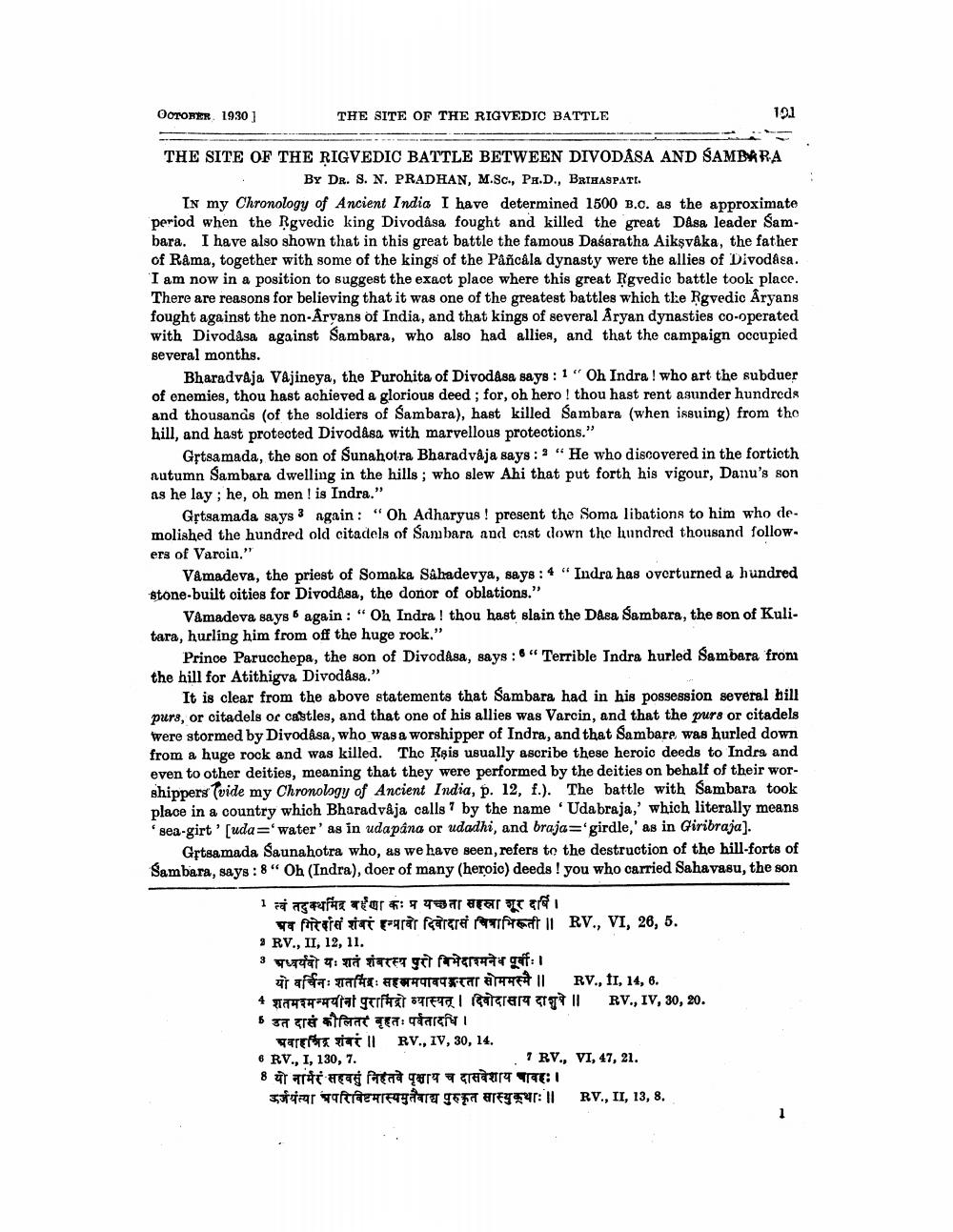________________
OOTORER 1930 1
THE SITE OF THE RIGVEDIC BATTLE
19.1
THE SITE OF THE RIGVEDIC BATTLE BETWEEN DIVODÁSA AND SAMBARA
BY DR. S. N. PRADHAN, M.Sc., Ph.D., BRIHASPATE. In my Chronology of Ancient India I have determined 1500 B.C. as the approximate period when the Rgvedic king Divodása fought and killed the great Dasa leader Sambara. I have also shown that in this great battle the famous Dasaratha Aikşvâka, the father of Rama, together with some of the kings of the Pancala dynasty were the allies of Divodása. I am now in a position to suggest the exact place where this great Rgvedic battle took place. There are reasons for believing that it was one of the greatest battles which the Rgvedic Aryans fought against the non-Aryans of India, and that kings of several Aryan dynasties co-operated with Divodása against Sambara, who also had allies, and that the campaign occupied several months.
Bharadvája Vajineya, the Purohita of Divodása says: 1" Oh Indra! who art the subduer of enemies, thou hast achieved a glorious deed; for, oh hero I thou hast rent asunder hundreds and thousands (of the soldiers of Sambara), hast killed Sambara (when issuing) from the hill, and hast protected Divodåsa with marvellous protections."
Gștsamada, the son of Sunahotra Bharadvaja says: "He who discovered in the fortieth nutumn Sambara dwelling in the hills; who slew Ahi that put forth his vigour, Danu's son as he lay; he, oh men ! is Indra."
Gộtsamada says 3 again : "Oh Adharyus ! present the Soma libations to him who de molished the hundred old citadels of Sambara and cast down the hundred thousand followers of Varoin."
Vamadeva, the priest of Somaka Sahadevya, says : 4 "Indra has overturned a hundred stone-built cities for Divodega, the donor of oblations."
Vamadeva says 6 again : "Oh Indra ! thou hast slain the Dasa Sambara, the son of Kulitara, hurling him from off the huge rock."
Prince Parucchepa, the son of Divodása, says : 6" Terrible Indra hurled Sambara from the hill for Atithigva Divodása."
It is clear from the above statements that Sambara had in his possession several hill purs, or citadels or castles, and that one of his allies was Varcin, and that the pure or citadels were stormed by Divodása, who was a worshipper of Indra, and that Sambare was hurled down from a huge rock and was killed. The Rşis usually ascribe these heroic deeds to Indra and even to other deities, meaning that they were performed by the deities on behalf of their worshippers (vide my Chronology of Ancient India, p. 12, f.). The battle with Sambara took place in a country which Bharadvaja calls 7 by the name 'Udabraja,' which literally means sea-girt' [uda='water' as in udapâna or udadhi, and braja='girdle,' as in Giribraja).
Grtsamada Saunahotra who, as we have seen, refers to the destruction of the hill-forts of Sambara, says: 8" Oh (Indra), doer of many (heroic) deeds ! you who carried Sahavasu, the son
1 त्वं तदुक्थमिद बर्हणा का प्रयच्छता सहस्त्रा शूर दर्षि।
va fortare IT a farer' fra 11 RV., VI, 26, 5. 3 RV., II, 12, 11. 3 अध्वर्यवो यः शतं शंबरस्य पुरो विभेदाश्मनेव पूर्वीः।
affa: Taf: EEWT9xrar ahi 11 RV., 11, 14, 6. 4 T otatgeria ETI aterary TTTIIRV., IV, 30, 20. उत दासं कौलितर बृहतः पर्वतादधि ।
vareta u II RV., IV, 30, 14. 6 RV., 1, 130, 7.
7 RV., VI, 47, 21. 8 यो नार्मर सहवसुं निहतवे पृक्षाय च दासवेशाय पावहः । ftar
T irai gan areg 4:11 RV., II, 13, 8.




